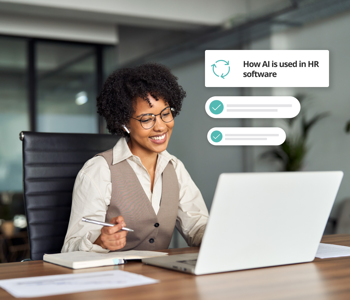
What is AI HR software?
AI HR software refers to human resources software that uses artificial intelligence technologies to automate tasks, analyse data and support strategic decision making. From recruitment and onboarding to performance tracking and employee engagement, it allows HR teams to work faster and more effectively.
Most HR AI software solutions are cloud-based platforms that use machine learning, natural language processing and predictive analytics. These tools help to streamline manual processes, identify trends in workforce data and personalise employee experiences without overloading your HR team.
How can you use AI in HR software?
AI in HR is all about improving processes. Let’s look at some of the most practical ways that AI in HR software can support your business. Whether you’re improving how you recruit or analysing engagement levels, HR AI software helps to optimise every stage of the employee lifecycle.
1. AI chatbots
AI-powered chatbots can answer employee questions in real time, 24/7. Whether it’s checking how much annual leave they have left or asking about HR policies, staff can get instant support without having to email HR. These AI HR chatbots improve responsiveness and free up HR teams to handle more complex tasks.
2. Recruitment
AI speeds up recruitment by screening CVs, ranking candidates and identifying the most suitable applicants. By analysing previous hiring patterns, AI can even predict which candidates are likely to perform well in specific roles. It also helps to boost candidate engagement by responding quickly and keeping applicants informed throughout the process.
3. Productivity tracking
With HR AI software, you can measure productivity using metrics like task completion rates, time spent on activities and team performance trends. These insights support more informed decisions around resourcing and workload distribution, ensuring your teams stay on track to meet important business goals.
4. Performance appraisals
AI can improve performance management initiatives by collecting feedback, flagging patterns in behaviour or output, and suggesting development opportunities. It ensures that evaluations and performance appraisals are data driven, fair and timely, supporting positive outcomes for employees and employers alike.
5. Workforce planning
AI in HR can help you to forecast staffing needs based on seasonal trends, business growth and employee churn. This makes it easier to plan recruitment drives, manage budgets, and make sure you’ve got the right people in the right roles. In turn, these insights unlock smarter workforce planning initiatives that scale with your business.
6. Employee satisfaction surveys
AI can evaluate open-ended survey responses using sentiment analysis, helping you to spot emerging issues before they escalate. These tools are able to categorise responses to employee satisfaction survey questions, highlighting emotional tone and identifying areas of concern. This level of insight can be extremely valuable for your HR initiatives but is very time consuming to achieve manually.
7. Training and development
AI is capable of recommending learning paths based on job roles, skills gaps and career goals. Employees can receive personalised training suggestions, while HR can track progress across teams to ensure effective learning outcomes. This use of e-learning at work not only supports development but also shows that your business is invested in each person’s long-term success.
What are the benefits of using HR AI software?
Switching to AI HR software can significantly change the way your HR team operates. By automating admin-heavy tasks and providing smarter insights, HR AI software creates space for people-focused work while boosting accuracy and reducing human error.
Improved efficiency
One of the clearest benefits of AI HR software is the time it saves. Automating repetitive tasks like CV screening, data entry and payroll processing helps HR teams to work faster and focus on more strategic responsibilities. These efficiencies lead to quicker hiring, smoother onboarding and faster support for employee queries.
Reduced costs
By taking over manual work and minimising the risk of costly errors, HR AI software can reduce your operational costs. After implementing these smart tools, you might not need to outsource certain services, and you’ll certainly spend less time on manual processes. AI also helps to improve resource planning, ensuring that your HR budget is used more effectively.
Increased employee engagement
When AI takes care of time-consuming admin, HR teams can dedicate more energy to improving the employee experience. AI-powered tools offer tailored communication, timely feedback and data-driven insights into how staff feel about their roles, supporting your employee engagement initiatives and helping to create a more inclusive, rewarding workplace.
Consistent processes
From how candidates are evaluated to how performance reviews are carried out, HR AI software improves HR processes by ensuring consistency across all processes. This not only improves the employee experience but also supports HR compliance. With clear, repeatable processes in place, you can be confident that all team members are treated fairly and professionally.
Smarter decision making
AI empowers HR teams to spot patterns that may be hard to identify through manual methods. For example, predictive analytics can help to forecast staff turnover or identify which team members might benefit from extra support. This allows managers to act proactively, reducing issues before they affect performance or morale.
Challenges of implementing AI HR software
While AI in HR software offers huge benefits, adopting it isn’t always smooth sailing. There are technical, cultural and ethical considerations that businesses need to manage.
Lack of human expertise
Implementing AI HR software requires staff who understand how to use the tools effectively. Without internal knowledge or external guidance, businesses risk underusing the software or misinterpreting the data. Upskilling HR teams or hiring AI-literate professionals is essential for success.
Risks and imitations of HR AI software
AI can bring risks such as algorithmic bias, data privacy concerns and a lack of context in decision making. For instance, a recruitment algorithm trained on biased data could reinforce inequalities that could damage your inclusivity initiatives. And while AI is smart, it can’t fully replace human judgement or interpersonal understanding.
Training requirements
Implementing AI isn’t just about installing new software; HR teams, managers and employees all need to understand how to use the tools to get the most out of them. Investing in training ensures that features are used correctly and that everyone is confident in navigating your new systems.
Pushback from employees
Some employees may feel uneasy about AI, particularly when it’s used to track performance or analyse behaviour. Clear communication is key to avoiding friction here. Businesses should be transparent about how data is used and reassure staff that AI tools are there to support the human side of HR, not to replace it.
The impact of AI in HR
AI has already had a significant impact on the HR industry, transforming the way businesses manage their workforce. Here are a few examples of recent innovations:
AI chatbots
These virtual HR assistants can answer employee questions anytime, anywhere, 24/7. This provides employees with instant access to information and frees up HR from fielding repetitive inquiries about benefits, policies, or basic onboarding procedures, to focus on more complex issues.
AI-integrated recruitment software
This software can automate tasks such as screening resumes, scheduling interviews and sending candidate communications. This allows HR teams to spend less time on administrative tasks and more time on finding the best talent.
AI employee monitoring software
Some companies are using AI to monitor employee activity and productivity. This data can be used to identify areas for improvement and optimize workflows.
These innovations, along with many others, have all made significant changes to the HR industry. They allow for faster decision-making and a more efficient use of resources. AI can also help gain valuable workforce insights, enabling HR to make data-driven decisions.
Prepare for the future with an AI HR assistant
From recruitment and engagement to training and planning, AI is already reshaping how HR teams work. By harnessing AI HR software in their daily processes, businesses can unlock new efficiencies, improve the employee experience, and make more informed decisions. That said, it’s vital to approach HR AI software implementation carefully, considering challenges like skills gaps, ethical risks and cultural resistance.
If you’re ready to future-proof your operations, PeopleHR’s intelligent AI HR assistant is here to help. To find out more about how we can support your journey with AI in HR software, book a demo or contact our team directly, and we’ll be happy to advise you.
